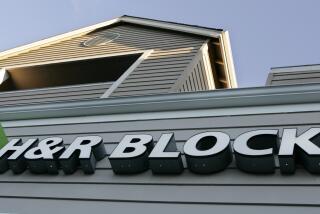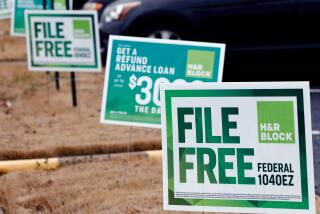Many Happy Returns Likely for H&R; Block : Taxes: Tough times prompt more people to use the firm to file forms electronically for quicker refunds.
- Share via
First the recession, now it’s tax time. Hardly the combination to lift one’s spirits. Unless you’re H&R; Block Inc.
The tax season under way in advance of the April 15 filing deadline is as crucial to Block--which dominates the tax-preparation business with nearly 9,000 company-owned and franchised offices worldwide, including 605 in California--as the Christmas season is to retailers.
Block earns nearly all of its annual profit in its fiscal fourth quarter ending April 30. The company prepared 12.4 million U.S. income tax returns last year, or roughly one out of every 10 filed with Uncle Sam.
While the weak economy is taking a toll on retailers, Kansas City-based Block could actually benefit from it. The recession and the approaching fall elections have President Bush and congressional leaders talking about individual tax cuts again in order to rekindle economic growth. Tinkering with the Tax Code often makes it, or seems to make it, more difficult to calculate the correct tax, which sends more people to Block.
So any changes this year could boost Block’s business beginning in early 1993, even though nearly half of Block’s customers--many of whom are low- to middle-income earners--file the simple so-called short-form returns.
Changing the laws “helps the tax-preparing business generally,” said Richard Tyler, vice president for marketing at Triple Check Income Tax Service, a Burbank-based concern that claims to be a distant second to Block, with 350 offices in 43 states.
Meantime, the recession’s strain on household budgets is prompting more people to file their returns electronically for a quicker refund, and that’s boosting Block’s electronic-filing business, called Rapid Refund. Block last year handled 67% of all returns filed electronically, a step that beginning this year will also be available to people who owe tax to the IRS.
(The IRS began allowing electronic filing for refunds in 1986, but the returns must be processed by IRS-certified “forwarders,” which include tax preparers and service outlets such as Mail Boxes Etc.)
The economic hard times, along with the steady decline of tax shelters in recent years, also mean a lot of taxpayers either don’t need or can’t afford to spend $200 or more to have an accountant or lawyer prepare their returns. Block’s average price is about $52 for a basic return.
All of which means Block should continue posting the double-digit profit gains it’s enjoyed for the past five years. In fiscal 1991, Block’s net income rose 13%, to $140.1 million, on a 13% gain in revenue to $1.2 billion. Block’s 4,900 franchisees generated an additional $790 million in revenue.
The earnings growth, together with Block’s strong balance sheet--it has zero long-term debt--has driven Block’s stock steadily higher over the past decade, from $5.50 a share in late 1982 (adjusted for three splits since then) to a close of $40.875 Wednesday in New York Stock Exchange composite trading, a new all-time high. Block has also raised its cash dividend every year since going public in 1962.
The company was founded in 1955 by Henry Bloch and his brother, Richard, who changed the spelling of the company’s name to end with “k” rather than “h” simply “to avoid mispronunciation,” said Thomas Bloch, H&R; Block’s president and the 37-year-old son of Henry Bloch.
Today, Block’s tax operation accounts for only 53% of its total revenue. The rest is split about evenly between the company’s CompuServe Inc. computer-services unit and its temporary-personnel subsidiaries.
The non-tax lines are growing as well despite the recession, although CompuServe is holding up better than Block’s temporary-help lines. CompuServe had a 21% jump in fiscal 1991 pretax profit, to $48.7 million, on a 22% rise in revenue to $251.6 million.
The company diversified to offset the tax business’ seasonal nature and to guard against any stagnation in tax services generally. But the expansion has not always gone smoothly. For example, Block bought Path Management Industries Inc., a business seminar and training concern, for $35 million in 1985. But Path never reaped the profits Block expected, and it was sold in late 1990 for $20 million.
Regardless, Block is not ruling out “adding a fourth leg to the stool” by making another acquisition, Thomas Bloch said. And Block’s tax-preparation business is anything but stagnant thanks to electronic filing, which is catching fire in the United States.
Using CompuServe’s system, about 5 million Americans filed electronically through Block offices last year, and Block’s Rapid Refund revenue shot up 77% in fiscal 1991 to $151.9 million. “I hope to see double-digit growth” again this year, Bloch said.
Block not only collects a $25 fee from customers for each Rapid Refund filing, but beginning this year it will also be able to collect a second fee for further speeding refunds to its customers with the help of four banks.
Here’s how it works: A few days after filing, most Rapid Refund customers get a bank loan equal to the estimated amount of their refund minus a fee for the bank (the average fee is about $29.) Customers are not subject to normal checks on credit-worthiness because their tax returns (and estimated refunds) are in effect collateral for the loans. The IRS later sends the actual refund directly to the bank to cover the loan. And beginning this year, Block will get a $3 licensing fee from the banks for helping to process each loan.
But Triple Check in Burbank, which tries to sidestep Block by targeting middle- and upper-income taxpayers willing to pay $130 or more for a prepared return, is opposed to the loans, Tyler said.
“People are paying too high a price for too little a return,” he said. “With the electronic filing fee and a fee for the loan, they can sometimes be paying up to 200% interest on an annualized basis to get their refund a week or two early.”
Bloch defended the program, saying the loans “certainly aren’t required, it’s an optional service and demand for it has been very, very strong.”
And with people who owe tax allowed to file electronically this year, Block’s revenue could get a further boost. But Thomas Bloch isn’t counting on a windfall.
“I don’t think demand for that will be as high as from individuals with a refund due,” he said.
When Returns Aren’t Taxing H&R; Block Inc. is the largest preparer of individual income-tax returns, with about 9,000 company owned and franchised offices worldwide, including 605 in California. The Kansas City, Mo.-based company also provides temporary-personnel and computer services. For fiscal years ended April 30: In millions Revenue: ‘91: 1,191 ‘90: 1,053 ‘89: 900 ‘88: 813 1987: 722 Net income: ‘91: 140 ‘90: 124 ‘89: 100 ‘88: 90 1987: 75 Revenue by segment in year ended April 30, 1991 In millions Tax services: $633 (53.1%) Temporary-help services: $266 (22.3%) Computer services: $252 (21.2%) Other: $41 (3.4%) Source: Company reports
More to Read
Inside the business of entertainment
The Wide Shot brings you news, analysis and insights on everything from streaming wars to production — and what it all means for the future.
You may occasionally receive promotional content from the Los Angeles Times.











